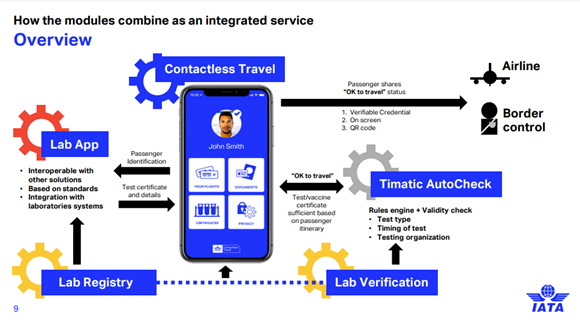ChinaTravelNews, Jerry Tang - While vaccination against COVID-19 provides a glimmer of hope for global travel to resume, the certifications and recognition of inoculation records are still far too fragmented to win confidence.
Public and private organizations are vying to introduce their versions of digital inoculative proofs. The European Union rolled out the EU Digital COVID Certificate in June this year in seven of the bloc's 27 member states. China is considering issuing its own version of vaccine passports by the end of 2021. Meanwhile, commercial entities have also introduced digital alternatives to paper vaccination cards or test results for COVID-19, such as the IBM Digital Health Pass launched in November last year.
Due to economic and geopolitical factors, these commercial or regional certification providers may lack the universal recognition needed to stimulate international travel recovery. Instead, a globally recognized and non-political organization like the International Air Transport Association (IATA) may have a better chance of building a universally accepted travel pass.
As a trade association for the world’s airlines representing some 290 airlines or 82% of total air traffic, IATA launched the IATA Travel Pass in April 2021, helping travelers to store and manage their verified certifications for COVID-19 tests or vaccines.
Albert Tjoeng, IATA's Asia Pacific Head of Corporate Communications, told ChinaTravelNews that over 70 airlines have trialed or committed to trial the IATA Travel Pass. Major airline companies including China Southern Airlines, Air France, Emirates and Singapore Airlines have participated in the program.
China Southern Airlines became the first airline in mainland China to announce a trial of the IATA Travel Pass last month. The Guangzhou-based carrier said in a social media post that the move could help promote China's international travel health certificate with international standards, accelerate digital and contactless travel for international travelers and avoid imported infection cases effectively.
"Having Chinese carriers participate in the trials allows us to identify teething issues and develop solutions that allow the IATA Travel Pass to be used effectively for travel to and from China," Mr. Tjoeng commented. "We welcome China Southern Airlines’ participation in the IATA Travel Pass trials. We are in discussions with other Chinese carriers on trialing the IATA Travel Pass."
How does the IATA Travel Pass work?
The IATA Travel Pass connects four major parties involved in international travel, namely destination governments, airlines, laboratories and travelers. The Travel Pass app does not centrally store test or vaccination data, but just links entities that need verification (airlines and governments) with the data issued by laboratories.
• First, a traveler creates his/her digital identity in the app. Based on the traveler’s flight details, the IATA Travel Pass will provide information on entry requirements, including testing locations.
• Upon receipt of the traveler’s test result or vaccine certificate, the IATA Travel Pass will verify the test/vaccine details to see if it complies with the destination’s border and health requirements.
• If all of the above conditions are met, the app will allow the passenger to share with airlines and border control officers the information about his/her verified identity and test/vaccine results, with an "OK To Travel" status.

For privacy concerns, Mr. Tjoeng pointed out that travelers’ information and health credentials are only stored in travelers’ mobile devices and there is no centralized database to worry about.
"The IATA Travel Pass is a tool to help manage travel health credentials, be it COVID-19 tests or vaccination. Both vaccination and testing have a role to play in the recovery of international travel," Mr. Tjoeng said. "It will also enhance the efficiency of airlines, airports and immigration authorities in processing a large number of passengers when travel demand picks up from the current low numbers."
There are practical reasons why the digitalization of travel processes will be needed. Modeling suggests that when air traffic returns to 2019 levels, passengers could spend up to 8 hours for verification at airports if the current paper-based processes are maintained for managing travel health credentials.
The IATA Travel Pass is uses IATA's Timatic database, which has played a big role in checking travel credentials during different times in the past including the Ebola crisis in 2013. But the organization emphasized that the Travel Pass is not a “vaccination passport” but a “health app” for COVID testing and vaccination certificates.
Mr. Tjoeng noted that the term "vaccination passport" is not accurate as it implies that the Travel Pass has only vaccination information and that only vaccinated people can travel.
The World Health Organization has recommended that governments do not require proof of COVID-19 vaccination as a mandatory condition for entry or exit. It is recommending relaxing measures such as testing and/or quarantine for travelers who are fully vaccinated and the admission of testing as an alternative for unvaccinated travelers.
More about confidence than technologies
With the digital and contactless technologies, the IATA Travel Pass is aimed at making it easier for governments to verify travelers' compliance to destination requirements, in a bid to accelerate the recovery of international travel activities.
"But ultimately the recovery of global travel takes place if governments open their borders to international travel," Mr. Tjoeng noted. IATA said it continues to urge governments to make data-driven decisions to manage the risks of COVID-19 when reopening their borders to international travel.
The border control and restriction rules that hinder the return of international travel are more about confidence than just technology challenges. Reopening amid the uncertainties of COVID-19 depends on skillful risk management and a trade-off between economic costs and public safety, which remains an open question in the global community.
"Countries across the world have different risk appetites to reopening borders, which are influenced by various factors, including their vaccine rollout status, infection levels, and robustness of their health systems," Mr. Tjoeng said.
Zero-COVID is not for long term, but will stay for now
It has been clear to medical experts and regulators worldwide that a Zero-COVID policy is not realistic for the long term, and the virus is here to stay.
A more debated question is when to reopen.
While Europe and America are gradually reopening their borders to vaccinated travelers, China is still focusing on eliminating both imported and local transmitted cases, taking lessons from the West’s rush to reopening shortly after vaccination.
Like its counterparts, IATA views vaccination and COVID-19 testing as a logical means for destinations to reopen borders without quarantine. However, as the efficacy of major vaccines like Pfizer, Moderna and Sinovac has been cast into doubt against the Delta mutant, the question is whether vaccination records suffice for governments to accept international arrivals with no limit.
Fully vaccinated travelers are still required to go through rigid quarantine measures in some Asian countries like China.
Lei Ruipeng, an expert at the School of Philosophy and Center for Bioethics at Wuhan-based Huazhong University of Science and Technology and a member of the WHO Ethics and COVID-19 Working Group, told Global Times that allowing vaccinated travelers to move unconditionally might not work, as vaccination does not necessarily introduce antibodies and antibodies do not necessarily build immunity.
More needs to be done in building confidence in vaccine efficacy to encourage wider acceptance and participation in these Travel Pass programs.
Meanwhile, Mr. Tjoeng believes that the IATA Travel Pass will continue to have a role in the travel process beyond the COVID-19 crisis, and the upshot is it has accelerated the digital transformation of the industry.
"This digital transformation is here to stay," he said.




